From 70’s domestic terrorism to short stories about Canada, we take a look at our writers’ summer reads 2015, and what they recommend you read, too.
Wales Arts Review Summer Reads 2015:
Go Set a Watchman by Harper Lee (Cerith Mathias)
The most anticipated literary event of Summer 2015 comes on July 14th with the publication of Harper Lee’s second novel Go Set a Watchman. Hitting bookshelves exactly 55 years and 3 days after the publication of her first and, until now, only offering, Watchman promises a sequel, of sorts, to the enduring classic To Kill a Mockingbird.

Written in the mid-1950s, Go Set a Watchman was the novel Lee originally submitted to publisher JB Lippincott. Her editor advised her to concentrate the story on the childhood scenes played out in the fictional town of Maycomb in the Depression-era Deep South, so Watchman was shelved in favour of what eventually became To Kill a Mockingbird.
The original manuscript, presumed to be lost, re-surfaced last year, discovered by Lee’s solicitor Tonja Carter, who incidentally is related by marriage to Monroeville’s other famous child, Truman Capote.
It is set some 20 years after Mockingbird, and focusses on an adult Scout, now living in New York and her struggles with issues both personal and political, involving her lawyer-hero father Atticus, society and the small Alabama town where she grew up.
News of the novel has been the subject of fevered speculation; Lee now lives in an assisted living facility in her native Monroeville, Alabama following a stroke in 2007, and the timing of its discovery and publication – shortly after the death of her older sister and fierce protector, Miss Alice – was viewed with suspicion by many. Lee has said that she’s “hurt” and “humiliated” by accusations that she was tricked, or even worse, coerced into releasing Watchman, saying recently, “I am humbled and amazed that this will now be published after all these years.”
This, coupled with the fact that Lee has apparently not edited the manuscript will make publication day an interesting one. But, for Mockingbird fans the world over, whose pre-ordered copies have already secured Go Set a Watchman’s top-spot on the bestseller lists, the day, over half a century in the making can’t come soon enough. And I, for one, can’t wait.
The Tortoise and the Hare by Elizabeth Jenkins (Kate Hamer)
There is something different about a summer read. It brings to mind the smell of suntan lotion and the crunch of sand between the pages. I find I’m looking for something a little more emotional, more hot-blooded in the summer. Winter is for long, involving novels with more pressing questions of life and death.
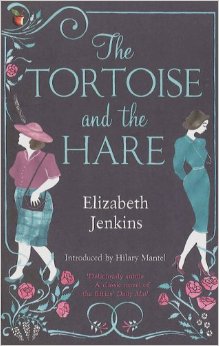
One of my summer reads this year is a re-read. I always feel I’m cheating myself out of reading a new book by re-reading but sometimes the lure is too strong. That’s the case with The Tortoise and the Hare by Elizabeth Jenkins. It was first published in 1954 although it seems to hark back to an earlier era. It focuses on that thing – the love triangle – but in a way of writing about relationships and marriage that still feels fresh and relevant. The three people – Evelyn Gresham who is a successful barrister married to Imogen. Imogen is younger than him, a beautiful woman but one who feels that not only her beauty but her purpose is failing. Soon, her son, who treats her with the contempt he’s learned from his father, will be sent away to school. It seems that Imogen is set to fade into a half-life of an unhappy marriage and her own lack of energy or interest. Enter into this Blanche Silcox. Imogen does not see this woman, their close neighbour, as any threat. Blanche is stout, masculine, dresses appallingly and is older than Imogen. What follows is the central question of the title – who is the tortoise and who is the hare? Blanche hunts, runs committees, drives and projects a kind of concentrated sexuality that Evelyn is immediately drawn to. Is she the tortoise who unexpectedly wins the race? What happens enables Imogen to finally find a ‘real’ life, love in a different form.
The writing is so glowing and subtle it leads you through the rocky emotional territory so skilfully I think it’s one of ‘the’ books of the last century.
Days of Rage by Bryan Burroughs (Craig Austin)
There’s nothing that says Summer time to me quite like a forensically researched history of the decade-long battle between the FBI and the U.S.’s homegrown revolutionary movements of the 1970s. As received wisdom would have it, the Vietnam War’s a-ragin’, the kids are getting angry, and in a righteous display of insurrectionary cop-baiting mayhem invading the streets and the palaces of power. Or that’s how it was supposed to work, at least. The reality, as Bryan Burroughs’ Days of Rage reveals, was something far less glamorous and often comically tragic.
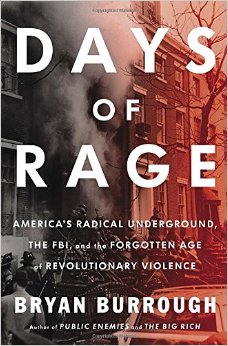
In our post-9/11 western world of stifling paranoia and institutionalised fear it’s all too easy to forget (or even be aware of) a not too distant past in which self-styled radical revolutionaries formed something truly unique in post-colonial American history; a genuinely underground resistance movement. Whether this took the form of the quasi-bourgeois Weathermen, the ruthless Black Liberation Army (BLA), or the inept yet ultimately iconic Symbionese Liberation Army (SLA), the FBI reported more than 2,500 bombings on U.S. soil within a tumultuous 18-month period between 1971 and 1972, a scattergun offensive upon property and people equivalent to nearly 5 attacks per day. In fact, and as hard as it might be to comprehend today, there was a moment during this tumultuous decade when many Americans’ viewed urban bombings as a semi-legitimate means of radical protest. A public nuisance more akin to a transit strike than the wrath of a poorly-resourced Al Qaeda; a time when the U.S. government had, for many, become the primary enemy and oppressor of its citizens. A political tinderbox laced with institutionalised racism and state-legitimised violence.
Burroughs’ painstaking historical research opts to shun either a political or moral standpoint, seeking instead to dissect the period stripped entirely of the stylistic and aesthetic trappings imposed upon it by the passing of time. In Burroughs’ cross-hairs the FBI play out a bungling meat-headed strategy rooted in the dated insights that had been gleaned in a long-since dead Summer of Love. Cops adorned with hippy beads, cops in kaftans, cops looking like idiots. Yet the self-deluding vanity of Weather’s revolutionary poster-girl Bernadine Dorhn, the pointedly overstated importance of the BLA’s “heart and soul” Joanne Chesimard, and the seemingly cannibalistic tendencies engrained within the movement’s psyche are given equally short-thrift.
In a secret history mired in bloodshed, conflict and furious rhetoric it is the infamous story of trust-fund-princess-turned-urban-revolutionary Patty Hearst that still resolutely refuses to slink into the recesses of history. Her infamous narrative, as twisted, spun and opportunistically re-written as it is has been (not least, by Hearst herself), continues to brand the emotional resonance of the – frankly, a bit rubbish – SLA deep into the cultural flesh of the USA. The iconic image of the one-time society brat playing out the role of the bank-robbing urban guerrilla ‘Tania’ says more about the America of the 1970s, a nation seemingly at war with itself, than any number of Hollywood blockbusters. For a 21st century audience, it’s as if Paris Hilton had been persuaded to hook up with Boko Haram after a concentrated spell of being locked in a cupboard whilst being forced to listen to them talk shite all day. A possibility as mind-boggling as it is bleakly comic.
Yet let us not forget, in spite of the self-delusion, the cruelty and the frankly baffling shortsightedness of so many in the 70s underground movement, the righteous feeling of societal revulsion from which it was born. ‘The aspects of patriotism’ as Bernadine Dorn forewarned, ‘that hush dissent, encourage going along, and sanction comfortable distancing and compliance with what is indecent and unacceptable. Those aspects are far to fundamental to ignore or gloss over’.
This book may not be the feel-good hit of the summer, but it is an expertly positioned account of another season. A hazy shade of a particularly explosive counter-cultural Winter.
Blue Nights by Joan Didion (Jo Mazelis)
I still have my copy of the 1979 edition of Slouching Towards Bethlehem, my name inscribed in ugly blue biro on the yellowing flyleaf: Jo Smith. Ten years ago I read The Year of Magical Thinking and most recently, Blue Nights. The first of these memoirs of loss put a crack in my heart, the second smashed it to pieces. Both deal with illness and the death of loved ones, but more than that it is Didion’s exquisite telling that astonishes me.
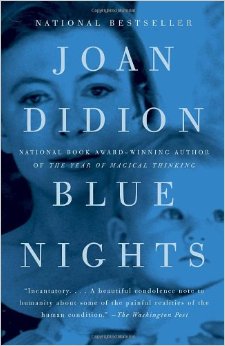
She has always seemed to be in supreme control of what is stated, what is not stated. Her prose is crisp and seemingly quiet even when she is writing about The Manson Murders or The Black Panthers, even when she describes her husband’s last night – the fire and candles lit, the salad tossed, Scotch poured.
For writers like Didion, words must be blood, they pump oxygen into experience, leave proof of existence and crucially they do not stop, cannot be staunched. As I read Blue Nights I found myself marveling at just how she managed to write it all.
The first words are a disquisition on twilight, on geography, on the blue of nuclear fuel rods. Then she describes her daughter’s wedding – the pink champagne, peach-coloured cake and peacocks.
Then, seemingly in an aside, she describes how on selling their California home, the buyer insisted chemicals be used to kill the termites. These noxious substances also killed the lavender and mint and the waxy flowered stephanotis that made the garden so attractive, and somehow there is a greater metaphor there than just the man’s shortsightedness and it is this picture of living things as achingly beautiful, as solid and everlasting … and then gone.
The past is indeed another country, but in Didion’s hands it is also near and now and vivid. It is there in the small details, in twilight falling, fading.
Poems of Arab Andalusia, edited byCola Franzen (Paul Chambers)
The moors exhaled their famous ‘last sigh’ overlooking Granada, the jewel of Al Andalus, in 1492. Though much of what prompted this fabled sigh of longing has been lost, there are startling glimpses to be found in this beautiful volume published by City Lights Books.
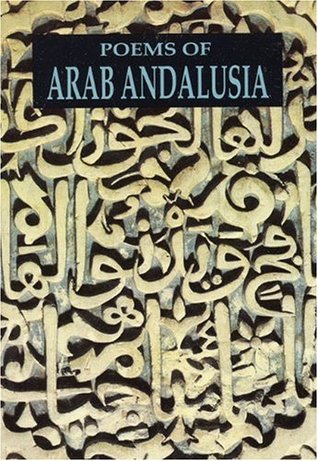
The poetic sigh of many of the authors in this collection anticipates the mournful longing of Boabdil, the last sultan of the Al Andalus, through works such as ‘Absence’ – ‘every night I scan / the heavens with my eyes / seeking the star / that you are contemplating.’ Yet other poems posses more of an ineffable sigh, inspired by the profundity of beauty, such as in the poem, ‘The Valley of Almeria’ – ‘when I look on you I tremble / as an Indian sword trembles / at the moment of tempering.’
The astonishing range of poetic tone contained in the collection, best expressed in a phrase from the poem, ‘Apology’ is ‘like wood from which come / both the singer’s lute / and the warrior’s bow.’
Though the poems here were originally written in Arabic, they contain a distinctly Spanish style, sensibility and sensitivity – the mysticism of the imagery, the purity of the phrase, the deeply sensual instances of personification.
Much of the subject matter has a striking sensual power, taking inspiration from wine to gardens to lances to water to warhorses to faces. Take, for instance, the final stanza of ‘The Beauty at the Revels’ – ‘the wine-sun setting / in the delicious west / of her lips / brings dawn to her cheeks.’ It is this sensuality, for me, which marks these poems as a highlight for summer reading – the season when light and heat are purest.
The poems range from the tenth to the thirteenth century and are taken from Ibn Sa’id’s codex of 1243, a collection of metaphorical fragments. Though these poems may be fragments they serve, as do the ruins of the Alhambra, as an exquisite, mystical and sensual reflection of an astonishing world.
The Scrapbook by Carly Holmes (Bethany Pope)
How much of our fate is written in our blood? How important is it to know yourself, and how much can you learn through the study of your family’s history? These are the questions asked and (to an extent) answered in Carly Holmes’ darkly numinous novel The Scrapbook. In it, three generations of women live out their variously twisted lives, ‘stealing’ men who had already been claimed by others (as though any human being could ever really belong to any other) while never being able to face the darkness in their own souls.
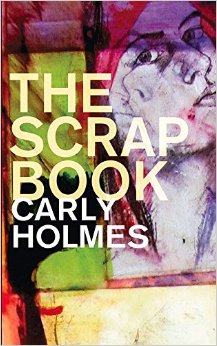
The novel is told from the perspective of Fern, a troubled young woman who has returned to the island she grew up on in order to care for her ailing, alcoholic mother (Iris) who has spent her life playing the role of the woman at the window, waiting for the return of the man she had on whatever weekends he could glean from his other family, his unknown wife. Iris was a neglectful mother and the depiction of her absentminded abuse is brilliantly written – her selfishness is singular in literature. The plot centres around Fern’s reluctant search for her father. It is Iris’s dying wish that fern find the man who abandoned the woman who lived only to be the object that would satisfy his craving.
As for the writing; it is superb. There are scenes that are reminiscent of the high gothic house-based psychology found in Jane Eyre, others (like the wonderful scene where the feverish, adolescent Fern spits out what she believes to be the swallowed soul of her grandmother; a black phlegm-bird that circles and caws, clawing the air above her head) that are reminiscent of the best of Neil Gaiman. The story is claustrophobic, but well-paced; a beautiful reminder that not every form of love is healthy, and the bonds we form (the bonds that strengthen us) are not always good.
The First Bad Man by Miranda July (Bethan Tachwedd)

Miranda July’s first book, the short story collection No One Belongs Here More Than You made an immediate and lasting impression on me, so much so that upon finishing it I immediately bought and airmailed a copy for my best friend who was in the one third of the way through a two year Scandinavian secondment. July’s quirky preoccupations were beautifully rendered in a collection that was easy to read and left a lingering flavour for all things Miranda. It was with great anticipation then that I made a start on her debut novel The First Bad Man and it did not disappoint. Those not worshipping at the church of July have noted that her offbeat style is one thing in the short story format, but quite another when presented in the novel form. Some may find the relentless quirkiness trying, but in my view it was par for the course and helped to realise the world that the novel inhabits perfectly. Similarly, there are those who feel that the quirkiness strays uncomfortably close to tweeness; whilst I don’t quite agree, I would concede that July is treading a fine line at times in this book. The novel centres on the life of Cheryl Glickman, a quirky (imagine that!) middle aged woman who experiences (or perhaps endures) a series of left-field characters and situations over the duration of the novel. I won’t go into too much detail, as part of the joy of July’s work is the element of surprise and wonderment that she can evoke from her colourful collection of characters. In equal measure funny, touching, surreal, and always written with a real flair for understated but often surprisingly powerful observation, The First Bad Man is a fine first novel and a solid addition to July’s eclectic oeuvre.
Dear Thief by Samantha Harvey (Gary Raymond)
I spend more time than is healthy wondering exactly where the novel is going, where can it go? Samantha Harvey is working on an answer.
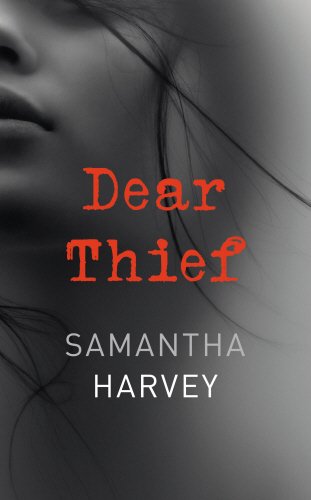
Harvey is preoccupied with the delicacies of what is the simultaneously governable and ungovernable human memory. Dear Thief is a beautiful, powerful, muscular piece of work that, and, if “the novel” as a phenomenon is to remain relevant as anything more than an historical artefact, this one will become a major work. It takes the form of a letter, and as the carefully woven tangents and whims of the narrator, constantly prodding a finger at her subject and object, Nina (who becomes Butterfly), tighten and sharpen, the reader enters a place of eastern mysticism, conversations about God and love and the love of God – it is a novel that lives on, and celebrates, a mature spiritual understanding of how we can survive as a human race. It may not profess to have the answers – this is a novel, not a handbook for a cult – but it is suggesting we start asking the right questions. As the world tears itself apart, isn’t it time we started asking not, “is there a God?”, but “is there a human vision?” We are not Godless just because God allowed himself to become irrelevant.
Like all of the most interesting novelists of the past fifty years, here high-end deep-rooted philosophy comes out with a swagger, a domestic sensibility, a naturalness. These people may be asking tough questions, but they stumble just like real people.
As a second-person narrative, Dear Thief is an unusually direct experience. I see the colours of Nabokov, and the delicate feet of the most grounded of the Americans, like Updike or Allegra Goodman, and perhaps some of the swishes of angle and pointedness that you might find in Robbe-Grillet or Michel Butor. But Dear Thief carries much more much further than that. It is not a novel to be compared to others. It is a missing link, perhaps, walking among us now. It’s like a lost middle 8 for “Positively 4th Street”, only composed with far more control, if less Hammond Organ, than Dylan’s throw-away wonder. It is a magical moment when you find out that Harvey has called Dear Thief a cover version of Leonard Cohen’s “Famous Blue Raincoat”. This novel is not just the best book I have read in the last 12 months, but it’s a book to which I will return, both for pleasure and to educate myself in the craft.
Objection Overruled by David Boulton (Nigel Jarrett)
Re-issued books are new books if you’ve never read them or never read about them, and some re-issues are timely. In 1967, when David Boulton’s Objection Overruled was first published, it was unfashionable to regard First World War courts-martial and allegations of cowardice as considerable additions to knowledge. Veterans were still alive in significant numbers and the concept of ‘shell-shock’, though not new, had to await for writers of fiction in particular to revive it.
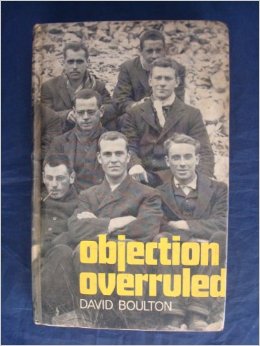
The book was re-printed for the first time last year and it’s on my list to read this summer, ‘twixt last year’s centenary celebrations of the outbreak of the war and next year’s of the Battle of the Somme.
Objection Overruled deals with the tribunals held across Britain to decide appeals against conscription, often, but not always, based on conscientious objection. For example, farmers in reserved occupation might plead that they needed the conscripts-in-waiting among their workforce or their families to remain on the land, doing their patriotic duty by other means. But ‘conshies’, as they were pejoratively known, had to endure their own private and public torments. A few times as a court reporter in Wales I came across Judge (later Sir) Tasker Watkins VC, who used to tell people he won his medal in World War 2 for rushing headlong at a German machine-gun post and ‘taking it out’. There was more to it than that. Writing up some reports at the end of one court session, I saw Tasker walking towards me, on his way home. We got into conversation. Refusing to fight in a war, he said, was as heroic as agreeing to join up and kill in valorous circumstances. It was an interesting and unexpected take on martial virtues. I recall his also saying that most battlefield heroics were acts of unselfconscious madness that just happened to have turned out right when they could just as easily have got the so-called ‘hero’ into a lot of trouble after the event.
I choose this book because, as a writer, I want to examine the background to some spectacular fictional treatments of the Great War, not that they are deficient in any way but that they might appear even more vivid if buttressed by examples of proverbial ‘strange’ fact. Writers always seek the whole picture, fact and fiction, if only to consider making a contribution of their own to the theme. There’s plenty of material in Objection Overruled to excite the imagination and goad one’s sense of injustice.
Burard Inlet by Tyler Keevil (Rhian Elizabeth)
I’ve read a lot of books recently but the one I’m going to write about here is Burrard Inlet by Tyler Keevil. It’s a collection of short stories that are set precisely there, at Burrard Inlet, “the body of water that divides Vancouver’s North Shore from the rest of the Lower Mainland.”
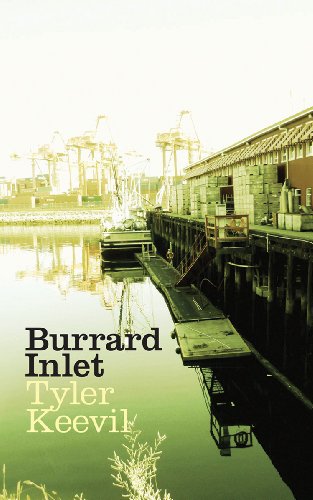
I think part of the reason I like this book so much is because it taps into an idea I’m really fond of – Canada. And I say an idea because I’ve never been there but want to go. This book’s got the snow and the ice, the mountains and rivers and streams, the tug boats, the seals, the tobacco chewing fishermen, the dirt bikes, the trucks that navigate the wide and rugged zigzag roads flanked by pine trees and of course, it has the beer. Lots of beer.
Although, the landscape is simply a backdrop for the beautiful writing and great characters, from ice barge workers to hitchhikers, weed smoking kids to mountain rescuers, all of whom are connected by this striking body of water. The stories aren’t all dramatic show stoppers, just little glimpses of those characters and that place but this isn’t to the book’s determent. Quite the opposite. As I say, it’s all observed in beautiful, panoramic detail.
Burrard Inlet left me feeling really peaceful, like I had just looked and sighed and pondered at a really nice ocean view and knew that I would keep it in my mind for a very long time. And even if it hadn’t deservedly made it onto all the prize longlists this year, I would still have chosen to write about it.
Randall by Jonathan Gibbs (Cath Barton)
The wonderfully irreverent premise for this brilliant re-imagining of the times of the Young British Artists (YBAs) is that we are asked to imagine that Damien Hirst died in 1989, run over by a train “apparently when drunk”, and that his place in the pantheon of the YBAs was taken by an artist called Randall.
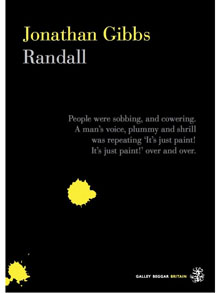
If Damien Hirst was confrontational, he had nothing on Randall. By the time of the opening of the novel Randall has himself died, and his one-time right-hand man, Vincent, has been summoned to New York by the artist’s widow, Justine, to help her unravel the mysteries of Randall’s last, posthumous assault on the art world. Jonathan Gibbs spools out the interwoven back story of Randall’s exploits and the present-day search for the meaning of his final shocking artworks in vivid, fluid writing, of which the quote on the cover is a splendid and apt taster. This is the best kind of page-turner, though I have to admit that at one point I succumbed to the temptation to jump forward to the next section of what Vincent and Randall were uncovering. Which is not to say that the history is dull – far from it. Jonathan Gibbs is very clever in slotting in little mentions of some of the real YBAs – Tracey Emin and Sarah Lucas amongst others – and other celebrities of the time such as David Bowie and Elton John also have their moments. This novel is from the splendid Norwich-based press Galley Beggar, the publishers brave enough to take a punt on Eimear McBride’s A Girl is a Half-Formed Thing after her years of rejection. They have good antennae – Randall is a very different book, but I reckon it’s another winner. Furthermore, if you’re flummoxed by the ending go to Jonathan Gibbs’s website and he’ll help you out. I appreciated that!
All The Places We Lived by Richard Owain Roberts (Joao Morais)
What could be more perfect for a summer read than a collection of short stories set in places such as Marmaris, Barcelona and Disneyland? Despite some of the more exotic locations, Richard Owain Roberts’ debut collection of short stories, All The Places We Lived, isn’t necessarily about the various places that each chapter is based in, nor is it about the people who inhabit these places. It essentially tells the story of a couple and how they grow into each other. We are not the same people we once were, the book seems to tell us, and we are not yet the people we will become. In ‘5AM: Hilton (Manchester, England)’ the narrator thinks that the woman behind the reception desk might be flirting with him: ‘She looks at her watch and says a guest, or–. I think that she wants to have a cocktail with me and get to know the real me and have a twelve to eighteen month relationship. After twelve to eighteen months, she will reassess her life and the kind of man she wants to be with. That man will not be me, but that’s okay, none of this has happened yet.’ Read it if you like the understated satirical style of Brett Easton Ellis, or read it if you understand how Frank and April Wheeler can feel both alone yet together in Richard Yates’ Revolutionary Road. But more than anything, read it if you like great fiction.
Paul McVeigh
After a long while of reading for work this is my summer of reclaiming reading for pleasure. I’m also having a tiny break from short stories. Along with half the planet I’m looking forward to Harper Lee’s Go Set A Watchman. Just starting To Kill A Mockingbird again to prime myself. I loved Laura van den Berg’s first UK short story collection The Isle of Youth and I have her first novel Find Me waiting by my bedside. I love a summer thriller so Sarah Hilary’s Someone Else’s Skin, Liz Nugent’s Unravelling Oliver and Robert Olen Butler’s The Empire of Night I’ve chosen as my beach reads. I’ve heard great things about Claire Fuller’s Our Endless Numbered Days so I have that. Two new books by authors I’ve loved over the years Patrick Gale’s A Place Called Winter and Anne Enright’s The Green Road will be by wine in the evening reads.












